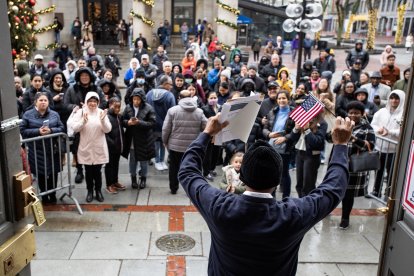The Biden-Harris administration is dramatically accelerating immigrant naturalization just months before the election
Approximately 3.3 million immigrants became citizens during Biden's tenure. Many of them can now vote in swing states.

A new U.S. citizen celebrates before a crowd in Boston, Mass
The Biden-Harris administration is noticeably speeding up the citizenship process for hundreds of immigrants who will soon be eligible to vote in November.
A report in The New York Times revealed that approximately 3.3 million immigrants became U.S. citizens during Biden's tenure. Many of them can now vote in swing states, such as Pennsylvania, Michigan, Georgia or Arizona, which will be decisive in the upcoming elections and will probably be defined by a small margin.
According to the NYT, in the last fiscal year the Biden-Harris administration has been processing citizenship applications at the fastest pace in a decade leaving behind "a backlog that built up during the Trump administration and the coronavirus pandemic."
"At ceremonies in courthouses, convention centers and sports arenas across the country, thousands of immigrants are becoming new Americans every week — and becoming eligible to vote in time for the presidential election this fall.... It’s unclear how many of the new voters live in battleground states, but a number of the states where Kamala Harris or Donald Trump must win have large and growing numbers of voting-age naturalized citizens, including Georgia, Arizona, Nevada and Pennsylvania," the NYT reads.

Política
El gobernador Youngkin ordena que todos los votos en las elecciones presidenciales de Virginia se emitan en papel
Emmanuel Alejandro Rondón
According to the media report, in Savannah, Georgia, immigrants from 19 different countries went to a federal courthouse to take the oath of allegiance.
Gladis Brown, who is married to an American and emigrated from Honduras in 2018, stated that she was amazed that her case was settled in less than six months.
Obtaining citizenship is the last step a migrant has to complete before being able to exercise the right to vote in the country. Normally, lawful permanent residents, i.e., green card holders, are eligible to become naturalized U.S. citizens if they have held that status for at least five years.
The other option is to have been married to a U.S. citizen for at least three years.
With the elections just around the corner, the NYT reported that many migrants are now motivated to obtain citizenship and register to vote in November.
Brown, for example, told the media outlet that she was eager to exercise her right to vote.
In a revealing analysis, Xiao Wang, chief executive of the firm Boundless, which uses government data to analyze immigration trends, said the naturalization process is working to even reshape "the electorate."
"The surge in naturalization efficiency isn’t just about clearing backlogs; it’s potentially reshaping the electorate, merely months before a pivotal election," Wang said. "Every citizenship application could be a vote that decides Senate seats or even the presidency."
In line with what Wang mentioned, the NYT detailed that the speed of processing applications is now at the same level as in 2013 and 2014.
"The U.S. Citizenship and Immigration Services took 4.9 months, on average, to process naturalization applications in the first nine months of the current fiscal year, compared with 11.5 months in fiscal 2021."
This remarkable acceleration of the process can be explained thanks to the efforts of President Joe Biden himself who, in 2021, issued a presidential order to disrupt Trump's immigration policy. One of the goals was to "substantially reduce current naturalization processing times."
In part, Biden's decision to end Trump's immigration policy provoked one of the worst border crises in the country's history.
The surge in immigrant naturalization also comes after 2020 elections were defined by thousands of votes in some key states.
For example, in Georgia, the difference between Biden and Trump was 12,000 votes, in Wisconsin it was 20,000, in Pennsylvania it was also less than 100,000 and in Arizona it was about 10,000 votes.
According to nationwide polls, the upcoming election between Vice President Kamala Harris and Donald Trump could also be defined by a narrow margin in swing states. With this, some Republicans denounce that new citizens could be incentivized to give their vote to the current Democratic Administration.
RECOMMENDATION






















